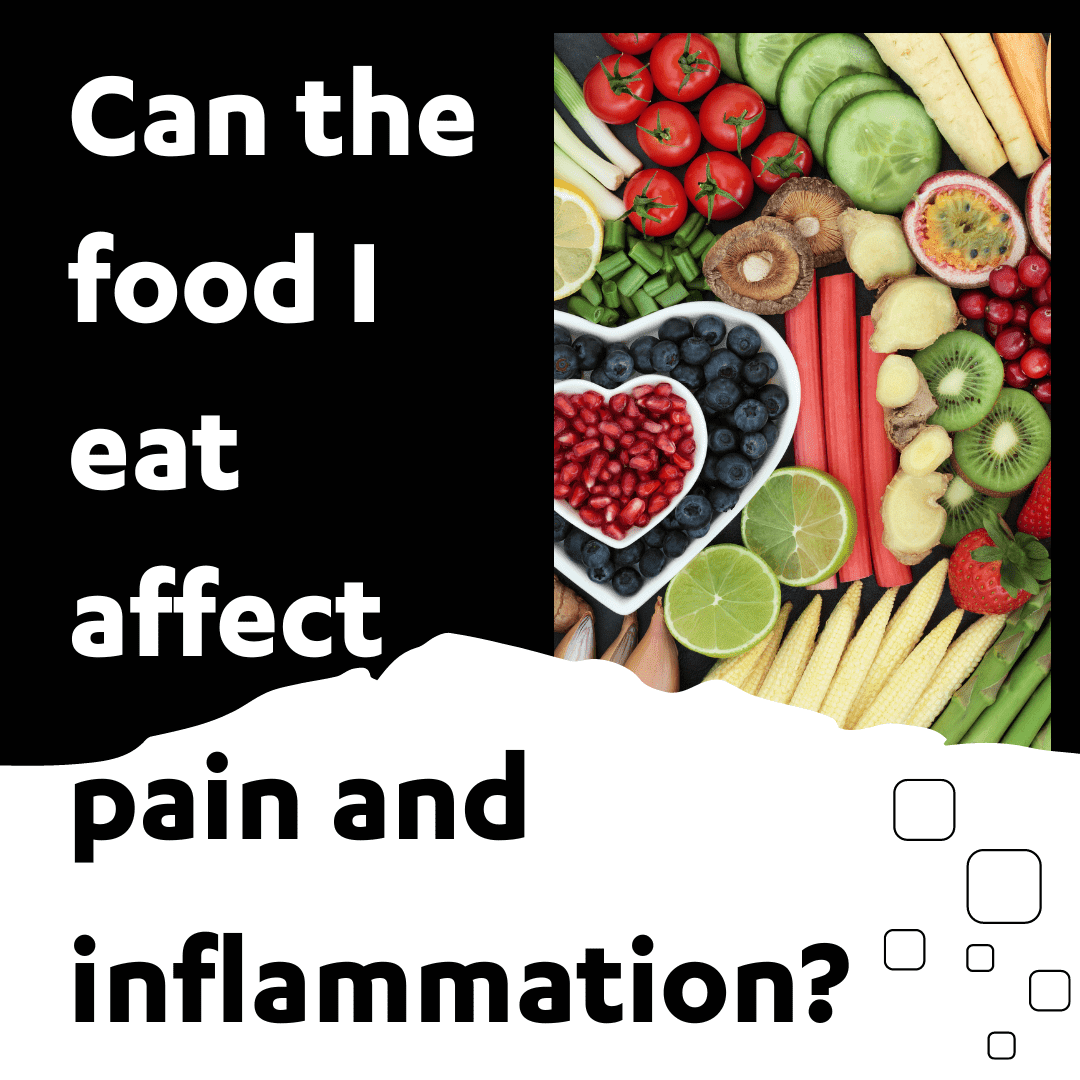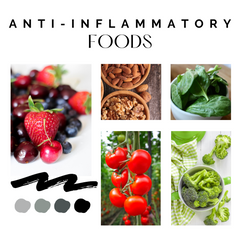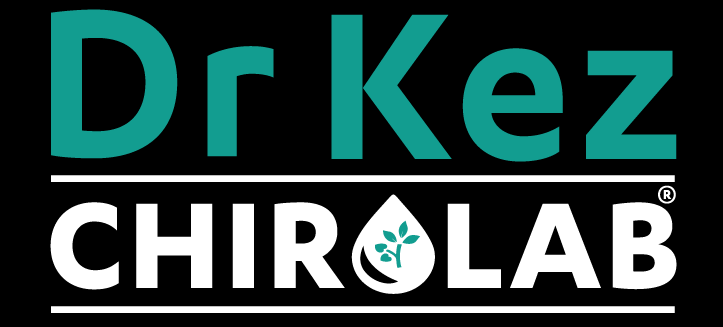
Are my food choices increasing inflammation and slowing down healing?
Are my food choices increasing inflammation in my body and hindering my healing? Surely not…right??? Nothing to do with the processed ham or creamy vanilla slice I ate for lunch? Oh dear…maybe I need to read on…
Before we get to the juicy part about food, it's important to chew your ear off about what inflammation actually is!

Inflammation is a necessary part of our body’s healing process. If you sprain your ankle, your immune system goes “OMG what just happened?” and initiates an inflammatory response to bring the appropriate immune cells to the injury, preventing infection and beginning the repair process. The same thing happens if you eat something dodgy and the all-too-familiar tummy gurgles begin when your body initiates an immune response in your digestive system, resulting in a mad rush to the loo with explosive diarrhoea. We don’t associate food poisoning with inflammation but it’s another example that we have all experienced. Likewise, if you have a cold or flu or suffer from hay fever etc. your immune system gets to work to trap the invading pathogen or allergen, again another form of inflammation. So needless to say, inflammation is an integral part of how the body protects us and initiates the healing process in the early stages of an injury or ailment. However, the inflammatory response can continue to occur long after the initial infection or injury has resolved. This is more likely to happen when we are stressed, lead a sedentary lifestyle, don’t get enough sleep or eat crappy food. Hmmm…tick a few of those boxes!?!? I’m hearing you!

The easily missed early signs of ongoing inflammation can be indistinguishable and extremely subtle, but after a period of time, the signs become more obvious. Ongoing fatigue sets in and then, eventually body aches & pains and oedema. The real worry, however, is what’s lurking below the surface. Over time, chronic inflammation actually starts to damage healthy cells, tissues, joints and organs and as a result, it may leave us vulnerable to conditions like heart disease, diabetes and autoimmune diseases such as rheumatoid arthritis.
Can we check our overall inflammation levels? Yes! A common way to determine inflammation within the body is to have a blood test, including a C-reactive protein count, which is a direct marker of inflammation. Doctors can also include a measurement of homocysteine levels, an amino acid that, when elevated in the blood, can be an indicator of chronic inflammation. High levels of homocysteine further increases the risk of heart disease.
Gawd…all this chatter about inflammation makes me want to eat a doughnut! What’s that you say?? Ohhhh…keep reading…
HELP! I need to know NOW! What can I do to reduce inflammation in my body?
If you have suffered from a recent injury and are looking for ways to prevent excess inflammation from making the injury worse and to speed up recovery, click here for more information. If, on the other hand, you feel that you have been experiencing ongoing inflammation in your body, continue reading for some tips on how including and avoiding certain foods can help reduce chronic inflammation.
Believe it or not, you can control, and even reverse chronic inflammation in your body by eating an anti-inflammatory diet. What you choose to eat and what you choose not to eat are both extremely important. Gulp!
What foods can increase inflammation in the body?
Foods that have been shown to increase the most inflammation in the body are processed foods. Think foods such as ham, bacon, hot dogs, sugary drinks and refined carbs like white bread and pastries.
Let's face it, not everyone has the time to make all their own food from scratch but you need to understand that a lot of chemicals and processing takes place to make processed products shelf stable. Ever tried reading an ingredient list and knowing all the ingredients? Usually, there are lots of numbers and extra bits you wouldn’t expect. These chemicals are not natural and as a result, our body reacts to them like they are a foreign substance (which they are).
The immune response mentioned above kicks in and the inflammatory process is initiated. Bam! If eating these types of foods is a one-off, special occasion, the body handles it like a common cold. The immune response is initiated, the body produces inflammation to trap the foreign chemical, the immune cells address the damaged cells and begin the repair process, and once the threat is neutralised, the body goes back to normal, awaiting the next attack.
If, on the other hand, we continue to consume processed foods, our bodies will be in a constant state of inflammation trying to deal with the barrage of foreign, dangerous chemicals constantly being put directly into our bodies (voluntarily, I might add!).

What makes this whole situation even worse is that these chemicals can also damage the good bacteria that are required to maintain a healthy gut. This not only leads to more inflammation due to a leaking, poorly functioning gut wall, but it also leads to less nutrition being absorbed, resulting in a decline in our overall body health. Avoiding these processed foods goes an extremely long way towards helping to rid the body of chronic inflammation.
Righto! Time to clean up the diet then! Where do I start?
Here are some examples of processed foods that are best to avoid if you’re wanting to stop overloading your body with inflammation:
-
Processed meats (hot dogs, salami, bacon, sausage etc.)
-
Refined carbohydrates (white bread, eateries, biscuits)
-
Fried foods (nuggets, French fries, dim sims)
-
Saturated fats (cheese, butter, cream, oil)
-
Chips (potato chips, corn chips)
-
Sugar (includes sugary drinks)
-
Diary (milk, yoghurt, cheese)
-
Alcohol (contains lots of sugar too…just saying!)
Sooo, can I eat smaller amounts? How can animal products in large doses be harmful?
Take arachidonic acid for example. Ara…what?!? This is a fatty acid that’s present in the membranes of both human and animal cells. When an injury occurs, arachidonic acid is released, initiating an enzymatic reaction that promotes the initial inflammatory response required to remove damaged tissue and initiate the repair process. If however, we consume animal products, the very nature of chewing these foods to break them down enough for digestion, releases arachidonic acid, which initiates our own body’s inflammatory response. If we consume a lot of animal-based products, including meat, poultry, fish, dairy and eggs, our body will be experiencing this heightened inflammatory response on an ongoing basis. This is just one example of how something designed to help us, when consumed in excess, can actually harm us. So in a nutshell, the more plant-based you go with food choices, the less inflammatory response will be created.
Does sugar make chronic pain worse?
Errrm…hell yeah! It’s a well-known fact that consuming sugary treats can lead to weight gain, diabetes and heart disease, but did you know that it can also make chronic pain and inflammation worse? Sad but true. Something that tastes amazeballs is actually so bad for us. Consuming sugar causes your body to release insulin and stress hormones. In turn, these chemicals can trigger inflammation, which is one of the most common causes of chronic pain. Inflammation is particularly noticeable as pain in areas where there is a minimal capacity for expansion, such as in and around joints, including the spine. Inflammation increases in these areas with nowhere to escape, causing pressure on the nerves and resulting in pain. Cue grumpy mood 😔.
Are there any other nasty, inflammation-inducing foods that are best to be avoided?

Sorry to say, yes. While we’re on the topic of ingesting products that contribute to inflammation within our bodies, it is definitely worth mentioning saturated fatty acids. Although we’ve covered most of the foods that fall into this category already in the processed foods discussion, it’s still worth mentioning the dangers of consuming foods high in saturated fatty acids. This includes products made with butter, oil, animal products, processed meats etc. These fatty acids aggravate inflammation both directly and indirectly. Saturated fats increase T helper 1 (Th1) and T helper 12 (Th12) cells as well as having an effect on toll-like receptors (TLR) which are directly involved in the immune response resulting in increases in inflammation systemically. Saturated fats also have an indirect effect on inflammation experienced in our bodies by making the gut lining more permeable, allowing larger proteins to pass which the body perceives as foreign and therefore initiates the immune response, resulting in inflammation. If increasing inflammation in the body isn’t bad enough, saturated fat also raises LDL cholesterol (bad cholesterol), increasing the risk of heart disease and stroke. If you had to re-read those last few sentences again, you’re not the only one. But it’s worth digesting this info for a greater understanding so when you are next sitting around chewing the fat (as they say!) at the next Sunday arvo vegan BBQ, you can tell your friends why there are veggie patties instead of snags!
Ditch the standard ‘Snatch & Grab’
Looking at the examples above it is clear that the foods to avoid can be broadly placed in the category of processed. Processed foods, that are put through processing with chemicals that our body perceives as foreign and therefore it initiates an immune response, are best avoided. Ongoing consumption of these types of foods results in constant low levels of inflammation that harms our tissues, joints and organs and leaves us vulnerable to disease. Knowing that these 'snatch and grab’ processed foods are so readily available and convenient, makes it hard to avoid as we are all so time-poor and on the lookout for a quick bite to satisfy the hunger (or boredom or socialising) but perhaps after learning what negative impact they are having internally on your body, thinking twice before knowingly feeding the pain and inflammation within your body is a great idea!
We are actually lucky that we’re heading into a massive plant-based boom. There are many new healthy options popping up, even in the large supermarket chains that have embraced and supported plant-based companies with a great range in stock. Once it’s on your food radar, you’ll see them everywhere. Admittedly, our absolute favourite company is Garden Of Vegan. With ready-to-go, oil free, gluten free, sugar free, flavoursome 100% organic meals in the fridge, I am never left without any healthy ‘snatch and grab’ options. And no, we aren’t sponsored by them! I just love the convenience of health they bring to a super busy life. It’s all about easy for me, not to mention all the added anti-inflammatory benefits as well! If you want to know more about Garden of Vegan click HERE and as a special introductory offer for our readers, use the code DrKezChiroLab for a delish discount!
Are whole foods the best alternative?

Obviously avoiding processed foods is the best way to stop adding more inflammation to your body, but if you are suffering from an ongoing condition or chronic systemic inflammation you’ll be looking for ways to reverse the inflammatory process and this can also be done using specific foods. Phew…sigh of relief! Whole foods are the best place to start when trying to assist your body to repair. What is a whole food diet you ask? Pretty much anything not processed and that you can prepare yourself using vegetables, fruits and whole grains, legumes, seeds and nuts. Our body requires a diverse complement of micro elements and minerals to repair our anatomy and this is best acquired by eating a varied whole-food diet. There are particular whole foods, however, that are touted as strongly anti-inflammatory and worth mentioning here:
- Tomatoes (high in lycopene - a powerful anti-inflammatory agent)
- Fruits (strawberries, oranges, blueberries and cherries) - high in antioxidants called anthocyanin
- Leafy greens (spinach leaves, kale and broccoli) - high in vitamins and alpha-linolenic acid
- Nuts (almonds and walnuts) - high in omega-3 fatty acids
Is it just about the food choices? What else can I do for helping rid the body of excess, unwanted inflammation?
Once we’ve eliminated the foods that add to inflammation and started consuming some of the above anti-inflammatory foods, it's time to get the body moving to help the lymphatic system move the excess fluid out from between your cells. Haha did you think it was all about the food and not a crumb left for anything else? But it makes total sense when you think about it. A light walk daily will dramatically help this quest. Keep in mind the lymphatic system doesn’t have a pump like the circulatory system has the heart. The lymphatic system relies on the muscles to contract in the area of the excess fluid to push it to the larger lymph nodes, where it can be transferred to the bloodstream and returned to the lungs and heart. Never fear…we have a solution for you! A fantastic way to accelerate this process is to use your Dr Kez Chirolab® Acupressure mat to stimulate the spleen, bladder and kidney meridians to get this fluid out of your body. To check out how to use the acupressure mat to eliminate excess fluid, click the link below:
The reality is our body is extremely capable of repairing itself and being ailment free and healthy, but it requires specific building blocks for repair to take place, and an adequate blood flow to get these building blocks to the areas of the body that require them. Eating a nutritious diet of whole foods helps to provide these building blocks, drinking plenty of water helps keep the blood flowing freely within our vessels to transport these building blocks and keeping our body moving, or using the Acupressure Mat regularly will strongly encourage increased circulation to get these building blocks to where they need to be, speeding up the healing process significantly.
If you’re not a lover of cooking, time-poor or simply overwhelmed at the thought where and how to start eliminating processed foods from your diet and replacing them with nutritious whole foods, consider looking into the Garden of Vegan options mentioned above. It seriously is as a great and convenient way to get the ball rolling. Nutritious whole-food meals ready to heat and eat to help you rapidly eliminate inflammation-producing foods and start feeling whole again.
If you prefer to stroll the aisles of your local supermarket, look for the fruit and veg section and add a whole-food protein, starting with some simple recipes. There are also many milk alternatives these days. It won't take long before you start to feel the changes within your body. Think of a sluggish creek starting to flow with into a stream of crystal waters. Your insides can feel just like this! Once you have felt the changes begin, you’ll definitely feel the difference if you have a bad food choice day. Sore and lethargy max…nanna-nap time!
One of our fav non-food tips! If you are riddled with inflammation and are in constant daily pain, consider jumping into a SoulSoak bath 3 times per week. SoulSoak is our very own blend of magnesium salts and essential oils to really fast-track your healing, immersing yourself in over 80 essential elements and minerals that can be absorbed into your system via the skin (don’t worry if you don’t have a bath, you can soak your feet instead). Packed full of:
- Dead Sea Salt
- Magnesium Fakes
- Epsom Salts
- Pink Himalayan Salt, and
- Essential Oils
- Rose Geranium, Lavender and Bergamot in the RELAX blend
- Eucalyptus, Lemon and Turmeric in the RECOVER blend
So there you have it! We truly hope that some of this info has helped your quest to reduce inflammation within your body and assists you to live a happier, healthier pain free-version of yourself. Almond latte anyone?










